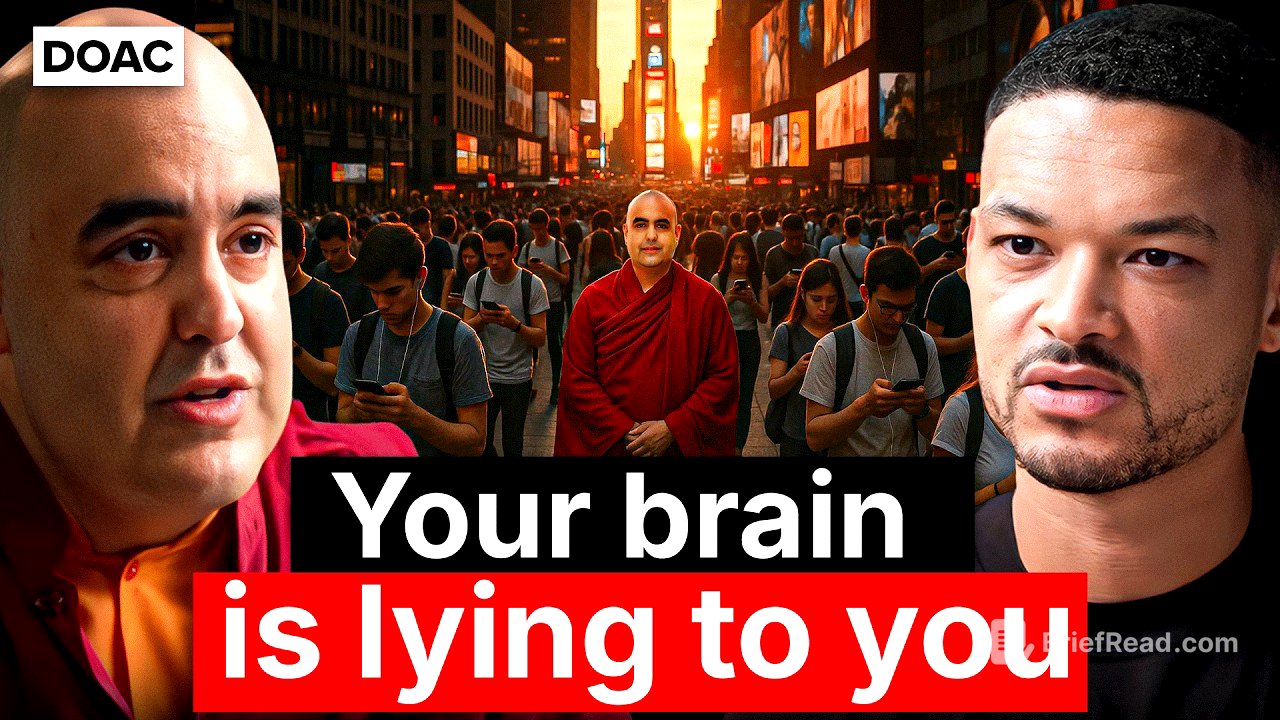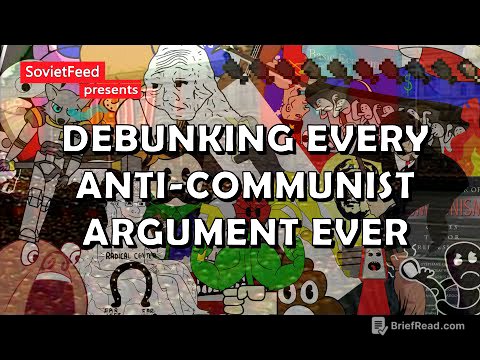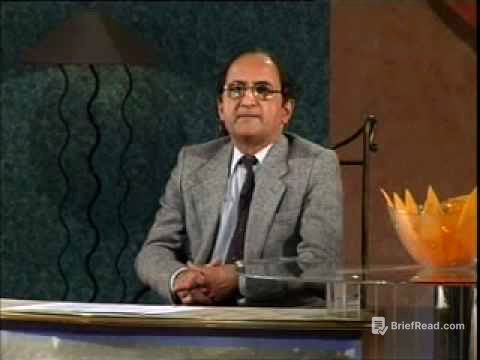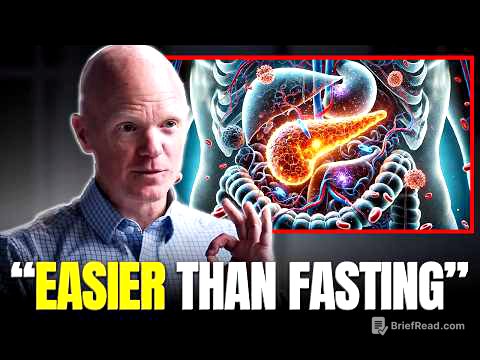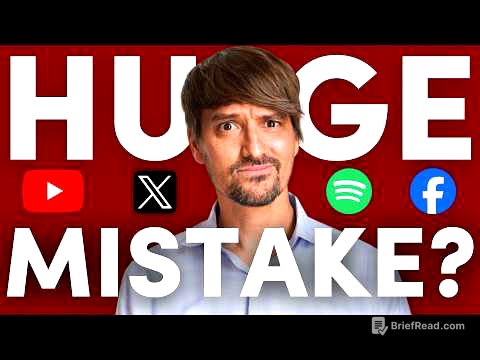TLDR;
In this episode of The Diary Of A CEO, host Steven Bartlett engages in a profound conversation with Gelong Thubten, a Buddhist monk, about meditation, mental well-being, and finding purpose in a world filled with distractions and anxieties. Thubten shares his personal journey from a troubled past to monastic life, offering insights into overcoming suffering, the importance of self-compassion, and how Buddhist principles can be integrated into modern life to achieve greater clarity and emotional control.
- Meditation is essential for managing stress and negative thinking in today's fast-paced world.
- True happiness comes from within, not from external achievements or material possessions.
- Self-compassion and acceptance are key to overcoming suffering and finding inner peace.
Intro [0:00]
The episode begins with an introduction to the central theme: the power of the mind and how modern life often makes individuals feel inadequate, leading to a sense of being prisoners of their own lives. Gelong Thubten's background as a Buddhist monk who has worked with Hollywood stars, CEOs, and corporations is highlighted, setting the stage for a discussion on how to manage stress, addiction, anxiety, and burnout through meditation and mindfulness. Thubten emphasizes the importance of conquering negative thinking and finding inner peace, rather than being controlled by external distractions and negative emotions.
Why Is Thubten's Message More Important Now Than Ever Before? [2:33]
Thubten explains that his message is particularly relevant today due to the accelerating pace of life driven by technology and the prevalence of misconceptions about meditation. He aims to clarify these misconceptions and promote a better understanding of meditation's true purpose and benefits.
Thubten's Concerns About Western Society [3:03]
Thubten expresses concern about the constant flow of information and persuasive undercurrents that bombard individuals in Western society, leading to increased stress and decreased confidence. He notes that people are constantly made to feel that something is missing, undermining their sense of self-worth and personal power.
Where Does Life Purpose Come From? [3:53]
Thubten connects the search for purpose to the decline of traditional religion, which once provided a sense of place and context within the universe. In a post-religious culture, individuals become overly focused on their own desires and external achievements, leading to insatiable wanting and a sense of emptiness. He suggests that true purpose may be found within, but people often lack the means to access it.
Is Search for Purpose a Misplaced Pursuit? [5:17]
Thubten clarifies that the search for purpose is not inherently wrong, but the obsession with finding happiness externally is misguided. He argues that people often feel like they are at the receiving end of life, constantly reacting to external circumstances. Meditation, however, can empower individuals to become the generators of their own experiences by taking control of their minds.
Why Is Western Society Increasingly Unhappy? [6:30]
Thubten observes that despite material comfort, Western society is experiencing increasing emotional discomfort, as evidenced by rising suicide rates and declining happiness rankings. He attributes this to the mechanisms of desire, where constant promises of enjoyment lead to a cycle of wanting more and feeling empty inside. The search for happiness becomes problematic because the search itself is a habit that leads to more searching.
Is It Wrong to Find Meaning in the Pursuit of Goals? [8:57]
Thubten explains that while finding meaning in the pursuit of goals is not wrong, it is important to understand the underlying psychology. The pursuit itself is driven by dopamine, which diminishes just before the goal is achieved, leading to a constant chase for the next thing. Meditation can reveal that what people are truly seeking—freedom from wanting—is already within them.
What Led Thubten to Become a Monk? [11:40]
Thubten shares that he became a monk through extreme suffering, rather than as a spiritual seeker. He describes a period of intense ambition and self-neglect, leading to self-loathing, depression, and anxiety. He went to a monastery in a broken state, seeking relief and healing.
Thubten's Difficult Past and Its Impact on His Mind [13:52]
Thubten recounts his troubled teenage years, including running with an older crowd, working as a jazz pianist while underage, and experiencing sexual abuse. These experiences, combined with his parents' sudden divorce, led to a period of self-medicating behavior and a persistent inner voice of self-disgust. He emphasizes that these factors contributed to his mental health struggles and eventual burnout.
Where Do Negative Internal Voices Originate From? [18:07]
Thubten explains that the negative internal voice stemmed from suppressing his suffering and pushing through difficult experiences without addressing them. This suppression led to a backlash of internalized anger, which was also influenced by environmental factors.
Who Influenced Thubten to Go to a Monastery? [19:05]
Thubten credits his childhood friend, Tara, with encouraging him to go to a monastery. She recognized his deteriorating health and suggested a year-long program for aspiring monks in Scotland, which ultimately changed the course of his life.
Thubten's Heart Condition [19:55]
Thubten details how a dangerous party lifestyle and overexertion led to a severe burnout and heart condition at age 21. This health crisis forced him to reevaluate his life and seek help at the monastery.
Key Aspects of Living as a Monk [20:50]
Thubten describes the key aspects of monastic life, including vows to abstain from intoxicants and celibacy. He emphasizes that these were not sacrifices but rather sources of relief, as they removed the elements that were making him ill. He also notes that celibacy fostered deeper, more heart-based relationships within the monastic community.
What Are the Advantages of Celibacy? [22:27]
Thubten explains that celibacy is not about moral judgment but about focusing one's energy and attention on meditation and helping others. It provides an environment to experiment with observing and transforming desires, rather than suppressing or indulging them.
Is Abstinence Sufficient to Overcome Compulsive Behaviour? [24:24]
Thubten emphasizes that merely abstaining from compulsive behaviors is not enough; it is essential to address the underlying mental and emotional factors. He uses the analogy of drug rehab, where giving up the substance is only part of the solution. The rest involves resolving the addicted mind and filling the void with positive practices like meditation.
What Is Buddhism? [27:07]
Thubten describes Buddhism as a path to inner understanding and mental discovery, rather than a religion focused on worship or deities. He explains that the word "Buddha" means "awake," and Buddhism is about exploring the power of one's own mind and the nature of reality. Concepts like hell and heaven are understood as states of mind.
Gelong's Journey of Healing [29:44]
Thubten recounts his initial struggles with meditation, particularly the misconception that it involves clearing the mind. He found that trying to clear his mind only amplified negative thoughts and stress.
What Is Meditation? [31:34]
Thubten clarifies that meditation is not about clearing the mind but about changing one's relationship with thoughts. He describes a typical meditation practice involving focusing on the breath, acknowledging when the mind wanders, and gently returning to the breath. This process strengthens the ability to choose where to direct one's mind.
Benefits of Buddhist Practices [36:40]
Thubten explains that meditation helps individuals find inner freedom and realize they are bigger than their pain and suffering. By observing one's thoughts and emotions, one can learn to disassociate from them and become the "sky" rather than the "clouds." This observational aspect is key to finding purpose and release in life.
Can a Buddhist Mindset Go Hand in Hand With Effectiveness at Work? [41:14]
Thubten addresses the misconception that meditation leads to a lack of drive or ambition. He argues that it actually enhances precision, presence, and emotional control, making individuals more effective in their work. He cites examples of successful CEOs who incorporate meditation into their daily routines to improve clarity and ethical decision-making.
How Does Buddhism Think About Victimhood and Trauma? [48:42]
Thubten explains that Buddhism offers a fresh perspective on victimhood by emphasizing that individuals are not defined by their past. He introduces the concept of emptiness, which suggests that reality is not as solid as it seems, and that clinging less to the past and future can lead to reduced suffering.
Breaking Free From Suffering [51:53]
Thubten shares his personal experience of a four-year retreat, during which he faced intense depression and anxiety. He describes how he initially tried to analyze his past but found that it only worsened his suffering. He eventually learned to drop the story and focus on the feeling, using the pain as a meditation object.
Can We Run Away From Our Pain? [58:18]
Thubten emphasizes that running away from pain is futile because the source of torment is within oneself. He recounts a dramatic moment when he tried to escape the retreat but realized he needed to confront his suffering directly.
How to Love Yourself When You Feel Broken [1:04:51]
Thubten describes how he learned to send compassion into the parts of himself he had hated, transforming his pain into a source of love and acceptance. He uses the image of holding a frightened rabbit or a bird with a broken wing to illustrate the tenderness he learned to show himself.
Coping With Grief and Loss [1:05:58]
Thubten shares his experience of coping with the murder of his teacher, Akon Rimpoche. He explains how the meditation practices he had learned helped him navigate the grief, anger, and despair. He emphasizes the importance of sending love into the pain and finding peace through forgiveness.
Focusing on the Pain in a Loving Way [1:10:22]
Thubten details the practice of focusing on physical sensations of pain and flooding them with love and compassion. He explains that this is possible because the mind is naturally compassionate, and by clearing away thoughts and judgments, one can access this innate kindness.
The Practice of Forgiveness [1:13:19]
Thubten discusses the practice of forgiveness, emphasizing that it is more about freeing oneself than condoning the actions of others. He explains that holding onto grudges only perpetuates suffering, while forgiveness is a strength that releases one from the burden of rage and hurt.
Are We Living in a Culture of Fear? [1:22:13]
Thubten observes that modern society is increasingly driven by fear, which is used in media, politics, and commerce to manipulate and influence people. He advocates for protecting one's mind with meditation and learning to be fearless in a frightened world.
How to Protect Yourself From Fear [1:25:08]
Thubten suggests practicing microscopic moments of meditation in busy situations, such as queues and traffic jams, to rewire the brain and meet stress with calm. This involves becoming aware of oneself, the ground beneath one's feet, and one's breathing.
The Gap Between Impulse and Action [1:27:14]
Thubten highlights the crucial gap between impulse and action, emphasizing that meditation helps one pause and make conscious choices rather than simply reacting. This allows individuals to respond to situations with mindfulness and intention.
Incorporating Meditation Into Your Daily Life [1:28:14]
Thubten recommends starting with 10 minutes of meditation each morning, setting an intention of compassion, and focusing on the breath. He advises against using spiritual paraphernalia and emphasizes the importance of letting go of quality control and simply doing it.
Live Meditation [1:31:23]
Thubten guides a short meditation session, focusing on setting an intention of compassion, becoming aware of the hands and shoulders, and noticing the breath. He reminds listeners to gently bring their minds back when they wander.
How Can Meditation Change Your Life [1:38:23]
Thubten explains that meditation helps individuals handle life's challenges better by sitting with discomfort and stopping the cycle of running away. He emphasizes that the entire human experience is shaped by the mind, and meditation is a way to transform the source of both good and bad experiences.
Why Did Thubten Take Vows for Life? [1:41:41]
Thubten shares that he took lifelong vows to be a monk because he felt a deep sense of alignment and purpose. He was drawn to the opportunity to work on his mind and be of service to others.
Does Working on Your Mind Ever End? [1:42:28]
Thubten emphasizes that working on one's mind is an ongoing process, not a one-time achievement. He acknowledges that he is still a mess but is now okay with being a mess, which has brought him greater happiness and peace.
The Gap Between Knowing and Doing [1:43:18]
Thubten highlights the importance of doing, not just knowing. He encourages listeners to realize that meditation will give them what they are looking for anyway—happiness, freedom, and release—and to approach it with the same energy they devote to their addictions.
Is Meditation Retreat a Good Idea to Get Started? [1:45:19]
Thubten suggests that going on a meditation retreat can be a good way to get started, providing a supportive environment and guidance.
Is Buddhism a Solution to the Current World Problems? [1:45:57]
Thubten notes that Buddhism is growing because it doesn't try to attract followers and because people are increasingly seeking ways to understand their minds and cope with the challenges of the modern world. He sees this as an exciting phase in history, where people are wanting to transform their minds and take control of consciousness.
Question From the Previous Guest [1:47:57]
Thubten answers a question from the previous guest about how he expresses love and appreciation for the people who matter to him. He shares that he tries to be there for them during hard times and to be with them without judgment, even though he often fails.
